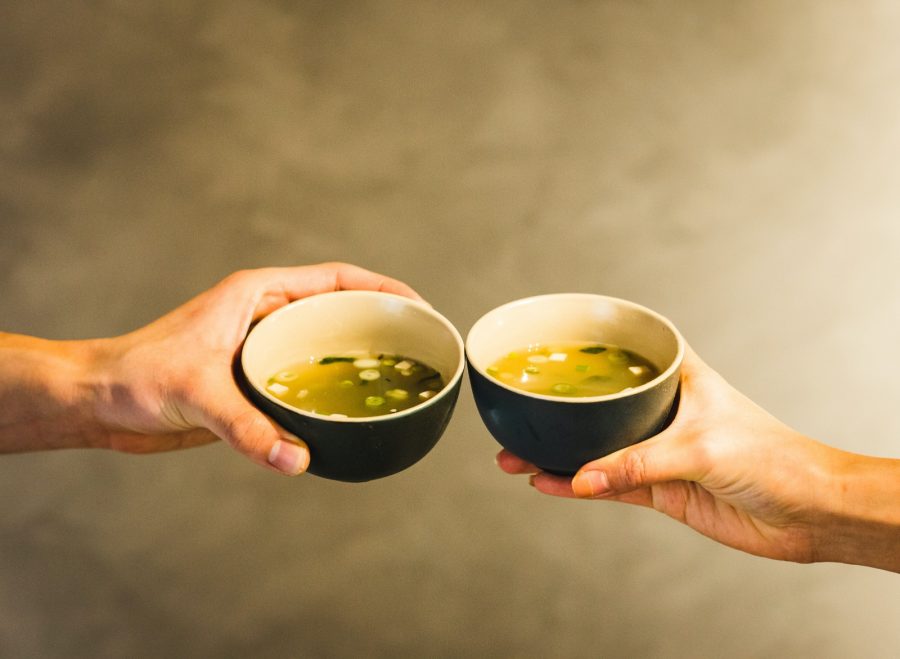An elderly lady went into a self-service restaurant, ordered a bowl full of broth, paid, and sat down at one of the available tables. She then realised that she had forgotten her bread. She went to get a loaf of bread and returned to her seat.
What a surprise! In front of the steaming bowl sat a coloured man, a black man, quietly eating.
“This is too much! – thought the woman, but I’m not going to pass for a lorpa”. Said and done. She sits down next to the black man, breaks the carcass into pieces, throws them into the bowl in front of the man and puts the spoon inside. The black man, complacent, smiles. They take a spoonful each, alternately, until all the soup is gone; the coloured man gets up, approaches the stall and returns, a little later, with a succulent plate of spaghetti and two forks. They both eat from the same plate, in silence, taking turns.
At the end, “See you around!” – greets the man, with the satisfied air of someone who has done a good deed, and leaves. “So long!” – replies the woman, still hardly recovered from her astonishment and following him with her gaze. Then he looked for the bag he had hung on the back of the chair and, holy God! The bag, where is it? So… that black man… She was about to shout “He’s a thief!”, when she saw the bag hanging from a chair, but two tables behind where she had been sitting. And on the table, a tray with her bowl of cold broth.
She realised what had happened: it was not the African who had eaten from her soup, it was she who, by making a mistake at the table, as a great lady, had eaten at the African’s expense.
When I read about this case in a newspaper, it made my head spin. The famous international debt, for example. According to the creditor countries, the Third World owes them tons of dollars. But one wonders if, under the conditions under which the loans were granted, the debts have not already been paid back double and triple. Are the poor countries deadbeats or are the rich powers not usurers, intent on converting the “external debt” into an “eternal debt”? Are the poor nations eating out of the rich nations’ purse or are the great ladies not eating and drinking at the expense of the poor?
And immigration is a good thing too. Why don’t we talk about the wonder that our country can offer work to foreigners, instead of the Portuguese going to look for it in Switzerland or Germany? Immigration is not a problem. It means an opportunity for everyone. Africans, Ukrainians or Brazilians make us more prosperous; they work, consume and compensate for our demographic deficit. Do they live at our expense or is it not more correct to say the opposite?
Moreover – and this fact is not generally taken into account – emigration (leaving one’s own country) and immigration (going to another country) are like movement in water. If it is not aired, it rots. Stagnant water is not kept drinkable and does not provide a suitable habitat for the development of marvellous aquatic fauna and flora. A similar thing happens in human history: a people closed in on itself becomes corrupted. Emigration and immigration guarantee the physical, psychological and spiritual health of any race or nation.
Our country, without going any further, is the result of many races that came from outside and mixed with the natives over the centuries. In the past, they often arrived as violent invasions, by fire and sword. Today, on the contrary, they come peacefully, willing to earn the bread and peace they need. These are enterprising, self-sacrificing and courageous people, as shown by the odyssey with which they face an uncertain future. They may well bring the new sap, the grafting that the old Lusitanian trunk, so worn out and complacent, needs.
I think, therefore, that it would be wiser to welcome them warmly, and share with them the table at the restaurant or at school, the bench at church or in the garden, the queue at the supermarket or at the stadium.
After all, what is the World if not a common home, made of land and sea, rivers and mountains, tropics and polar regions, arable land and forests, inhabited by humans and all sorts of living species, breathing the same air, living together in solidarity? Men and women, regardless of colour and ethnicity, will be wise and happy to the extent that they deal with each other as neighbours and acquaintances, as friends and brothers. To turn history into a saga of fratricidal struggles is sheer madness.
Because, in the final analysis, is the difference between the Swiss madam and the black African that great? This 20th century French flower, Magdalene Delbrêl, was right to point out that in the face of the common titles of human beings and children of God, differences are blurring, social distinctions are wavering and our categories of values are becoming fragile.
Just as X-rays,” he continued, “make clothing, muscles and all that is not essential to an organism disappear on the plate, so, in the face of this name of human being and son of God, everything that does not constitute our true kinship disappears. The least we can do is share the soup bowl.
Abílio Pina Ribeiro, cmf
(PHOTO: Louis Hansel)






